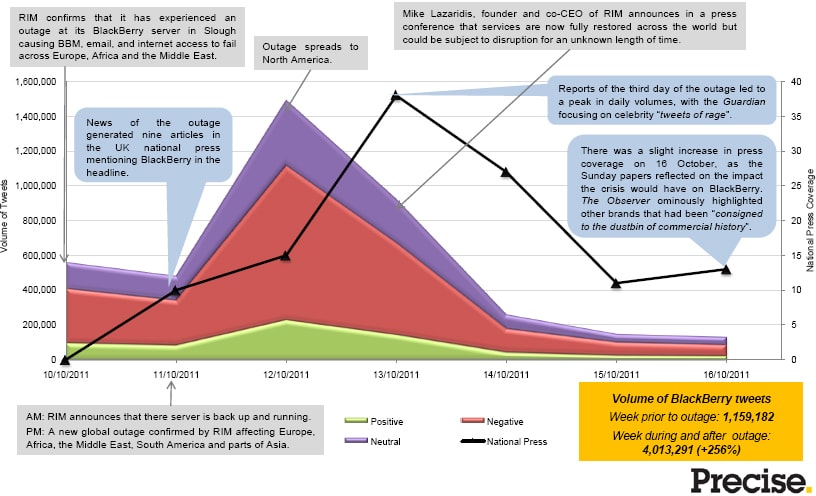Towards the end of last year, when BlackBerry mobile phone users experienced problems getting internet access and emails, Twitter was buzzing with furious complaints about BlackBerry. But how much did this Twitter activity affect BlackBerry’s reputation and make the news? According to recent research into the affects of Twitter on the news agenda carried out by media intelligence specialist Precise, Twitter stirred up plenty of trouble for the BlackBerry brand.
The problem was caused by an outage at the BlackBerry server in Slough in October 2011. On the first day of the outage, the number of Tweets mentioning the brand leapt by more than 400,000 Tweets. The total volume of Tweets was up by more than one million than usual by the third day of the outage. Even 30 days after the outage ended, BlackBerry mentions were 50,000 per day higher than in the 30 days before. And over one third of these Tweets were negative.
All these complaints generated the unwelcome attention of the media. There were 54 articles in the UK national print media, and more than 1,000 stories across leading newspaper titles worldwide. One of the reasons why so much negative publicity was created by the outage is attributed to BlackBerry’s failure to manage a quick fix to the problem and react to criticisms speedily enough. A valuable lesson for all brands.
The fact that media picked up on the Twitter reaction to Blackberry‘s outage, is no surprise to Marcus Gault, managing director of Precise ’s Insight Division, as he points out that the mainstream media often turn to Twitter as a news source. However, he points out that the speed and unpredictability of Twitter news means it can be challenging for mainstream media to know which stories are worth selecting. He adds, “Over the last 12 months, the relationship between Twitter and traditional media has become increasingly complex. It’s fascinating to see how a perfect storm can grow out of the feedback loop that develops between Twitter and mainstream media, with each retelling of the story leading to a marked growth in the audience.
“In contrast, some Twitter chatter generates significant traffic but if it doesn’t capture the attention of newspapers and broadcasters, the story never reaches beyond the boundaries of a fairly narrow group.” Unfortunately for BlackBerry, the outage last year succeeded in stirring up a frenzy in Twitter, followed by a media storm that was bad news for its reputation.
Methodology
Precise researched four stories in depth that trended on Twitter in 2011, including the BlackBerry outage. The measures used were the total number of Tweets and press articles mentioning the brand. The focus was on the increase in volume of Twitter activity after the story broke, compared with the volume of activity before the story broke.
PR Masterclass: The Intersection of PR and GEO
Join PRmoment for a Masterclass featuring 10 of the industry’s foremost experts. You will walk away with a clear, actionable strategy for adapting your content to an AI-first search environment.
Taking place on Wednesday 25th February in London, both virtual and in person tickets are available.
Early bird ticket sale ends Friday 9 January.
PR MasterclassIf you enjoyed this article, sign up for free to our twice weekly editorial alert.
We have six email alerts in total - covering ESG, internal comms, PR jobs and events. Enter your email address below to find out more:










